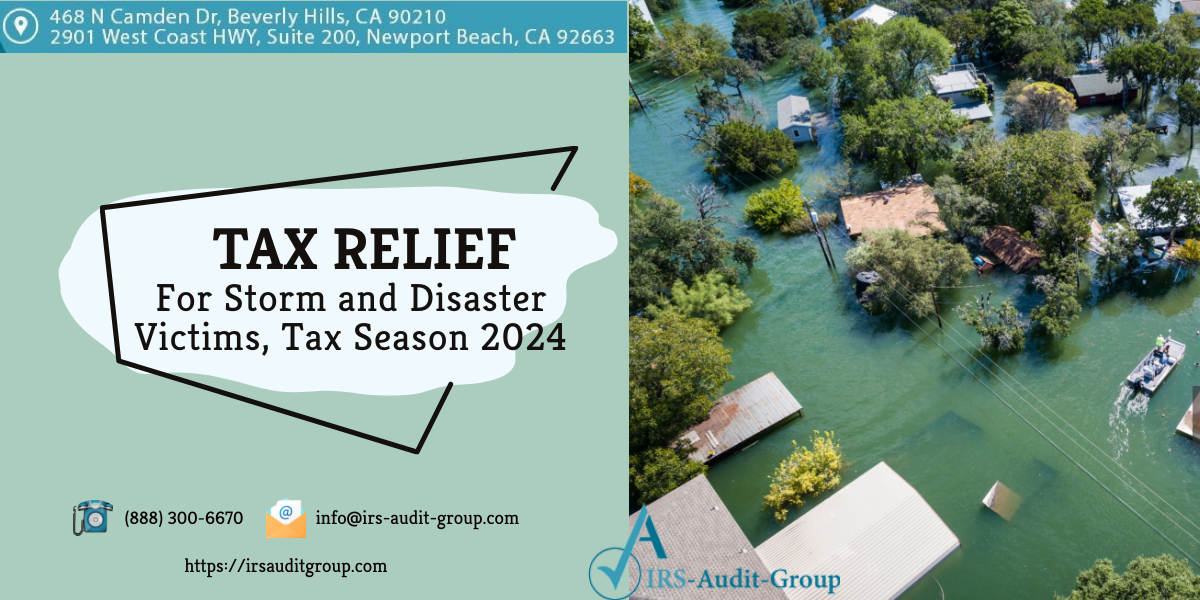Every year, based on the Federal Emergency Management Agency’s (FEMA) federally declared disaster areas, the IRS will implement administrative disaster tax relief measures. For the Tax Season 2024, the IRS made special tax law provisions to provide affected individuals and businesses with additional time to file returns, pay taxes, and complete other time-sensitive tasks. This assistance is specifically tailored for taxpayers who are affected by a disaster declared at the federal level, guaranteeing that they receive essential assistance during difficult circumstances. It is important to note that certain conditions may need to be met in order to qualify for the tax relief and provisions offered by the IRS. By following the established procedures and guidelines, disaster victims can benefit from the assistance provided by the government to alleviate the financial burden caused by the disaster.
The relief for the tax season 2024 extends the deadlines for filing and paying taxes that fell between Sept. 10, 2023, and June 17, 2024. This means that individuals and businesses affected in the disaster regions will now have until June 17, 2024, to submit their returns and settle any outstanding taxes from this period.
Who Qualifies for the Extension in Tax Season 2024?
In order to be eligible for an extension on filing your taxes, it is required that you are a resident or business situated in a region identified by the Federal Emergency Management Agency (FEMA) as a federally declared disaster area. This encompasses not only the main area impacted by the disaster but also the surrounding areas that have been affected.
Furthermore, the IRS is prepared to collaborate with any taxpayer residing outside the disaster zone but whose essential records are required to comply with a deadline falling within the extension period are situated in the impacted region. Taxpayers eligible for assistance and residing beyond the disaster zone must reach out to the IRS at 866-562-5227 for further guidance and support. This provision also encompasses individuals who participated in relief efforts and are associated with a reputable governmental or charitable institution.
What is included in the Extension?
Extension generally encompasses a range of tax deadlines, which can include filing income tax returns, making quarterly estimated income tax payments, and submitting different business tax returns. Additionally, extension can be utilized for other tax-related tasks, like requesting an extension for an individual tax return or making contributions to an IRA. The June 17, 2024, deadline will now apply to the following activities.
- Individual income tax returns and payments normally due on April 15, 2024.
- 2023 contributions to IRAs and health savings accounts for eligible taxpayers.
- 2023 quarterly estimated income tax payments normally due on Sept. 15, 2023, and Jan. 16, 2024.
- Quarterly payroll and excise tax returns normally due on Oct. 31, 2023, and Jan. 31 and April 30, 2024.
- Calendar-year partnership and S corporation returns normally due on March 15, 2024.
- Calendar-year corporation and fiduciary returns and payments normally due on April 15, 2024.
- Calendar-year tax-exempt organization returns normally due on May 15, 2024.
How to Claim the Extension?
Taxpayers residing in a federally declared disaster area who qualify for the extension do not have to take any action to receive it. The IRS will recognize individuals located in the designated disaster zone and grant them an extension on their tax deadlines without requiring any additional steps. In the event that you receive a penalty notification from the IRS due to late filing or payment of taxes, you have the option to contact the phone number provided on the notice to request a waiver of the penalty.
The tax relief measures have been implemented as a component of a well-coordinated federal initiative aimed at addressing the extensive harm inflicted by these calamities. These measures have been devised after careful evaluation of the local damage assessments conducted by FEMA, ensuring that the relief efforts are targeted toward the areas most affected by the disasters.
IRS Audit Group
IRS Audit Group consists of tax professionals, CPAs, enrolled agents, and tax attorneys. We are located in Los Angeles; California and our primary area of expertise is IRS Tax Audit Representation. However, our certified professionals cooperate and work with all IRS offices across the country. Please contact us for more information. https://irsauditgroup.com/contact/
Telephone Number: (310) 498-7508
info@irs-audit-group.com

